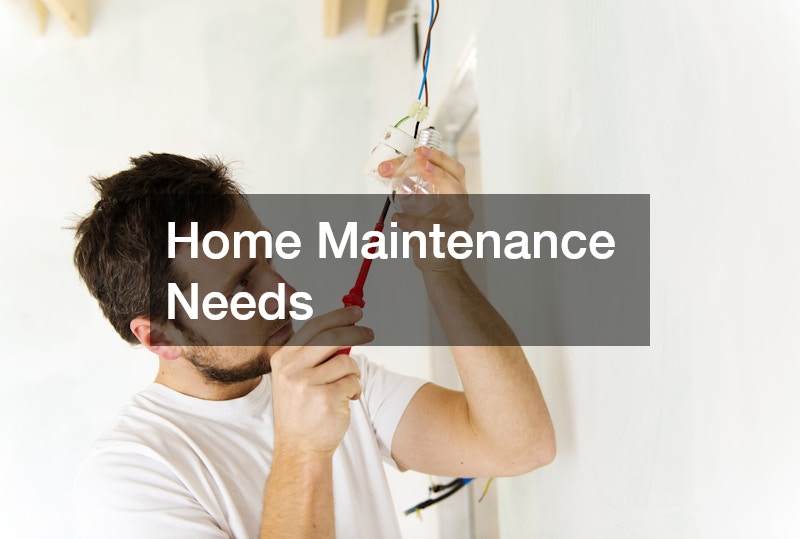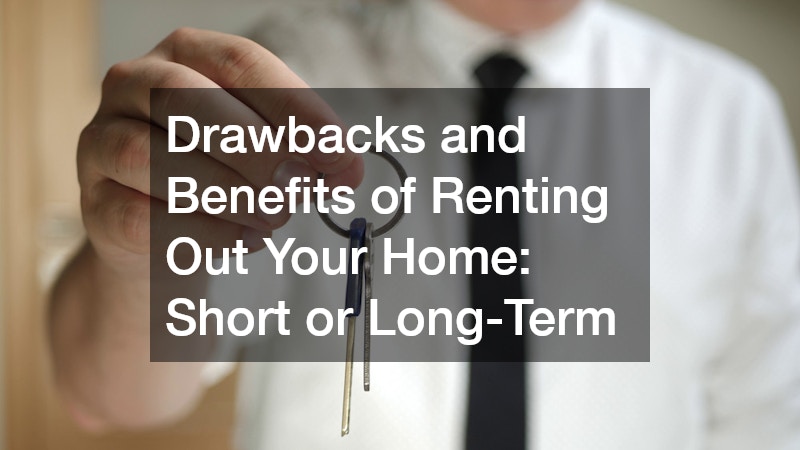Renting out your home can be a smart financial move, but it comes with a range of decisions and responsibilities. Whether you’re considering a short-term setup or planning to lease your property long-term, each option presents its unique challenges and rewards. Understanding these factors is essential if you want to make the most of your investment while minimizing potential stress. This guide takes you through the major drawbacks and benefits of renting out your home that you should weigh before listing your property.
There are many layers to renting out a home, starting with choosing the right type of rental plan. Once you’ve selected the best format, you’ll need to manage guest turnover efficiently and ensure your property remains in top shape. Maintenance needs, both scheduled and emergency, are key to keeping your property profitable and livable. Along the way, you’ll have to think about climate-related costs, repair issues, pest prevention, and the people you might hire to help manage your property.
Marketing your listing effectively and identifying your target audience are also critical steps. This includes thinking strategically about who your renters might be, from families and tourists to retirees, and tailoring your property’s presentation accordingly. And when problems arise, it’s important to have a reliable support network in place, including repair professionals and emergency service providers.
This article will explore ten essential considerations that homeowners should evaluate when deciding whether to rent their property. Each section will examine a different aspect of the rental process to provide a well-rounded view of both the risks and the potential rewards. By the end, you’ll have a clearer understanding of whether the short-term hustle or the long-term commitment is the right path for you.
1. Types of Rental Plans

Choosing between short-term and long-term rental formats is one of the first big decisions homeowners must make. Short-term rentals offer flexibility, higher per-night earnings, and the potential to use your property between guests. On the other hand, long-term leases provide more predictable income and reduce the frequency of tenant turnover. Each type requires a different strategy for pricing, furnishing, and managing expectations. Understanding the key differences is crucial for maximizing returns and minimizing stress.
For homeowners in desirable locations, particularly tourist hotspots, short-term setups can be especially lucrative. These arrangements often fall into the high-end travel category, where guests expect unique and well-furnished spaces. This approach may work well if your home suits luxury vacation rentals, which cater to travelers looking for memorable experiences. However, the income can fluctuate depending on seasonality, competition, and travel demand.
One of the primary benefits of renting out your home through either plan is the ability to create a reliable income stream. The type of rental model you choose impacts how much time you’ll spend on upkeep, how you screen tenants, and what your financial risks might be. Some homeowners find that a combination of both short- and long-term rentals, based on the calendar year, offers the best of both worlds—flexibility and stability.
2. Managing Guest Turnover
High turnover can be both a benefit and a burden, depending on how it’s handled. Short-term rentals typically involve more frequent guest changes, which require a system for cleaning, key exchanges, and inspection. Long-term leases reduce these logistics but offer less flexibility. As you increase turnover frequency, the administrative workload also grows, potentially impacting your time or requiring outside help.
This is where hiring professional support becomes essential. Many homeowners rely on property managers to oversee the turnover process, coordinate cleaning crews, and handle bookings or lease renewals. These experts can also address guest concerns, enforce rules, and keep everything running smoothly while you’re away or busy. The trade-off is their service fee, which typically eats into a portion of your rental income.
Still, the benefits of renting out your home with the help of management professionals often outweigh the costs, particularly if you own multiple properties or travel frequently. Delegating turnover tasks ensures your property maintains a high standard of service, reducing negative reviews and tenant issues. It also gives you more freedom to focus on other aspects of your life or investment strategy.
3. Home Maintenance Needs

One of the most consistent responsibilities homeowners face is property maintenance. Whether you’re renting short- or long-term, your home must be safe, clean, and functioning well. Routine upkeep can range from lawn care and appliance checks to repainting or fixing minor wear and tear. Regular maintenance not only preserves property value but also boosts tenant satisfaction.
When a house is designated as a rental house, the expectations shift. Tenants typically notify you about issues, but they expect timely responses and quality solutions. Maintenance obligations can become more demanding if you live far from the property or manage multiple rentals.
One of the often-overlooked benefits of renting out your home is the opportunity to schedule and fund regular improvements using rental income. Instead of waiting for something to break, you can set aside a portion of your earnings for seasonal upkeep. This reduces the likelihood of emergencies and increases the lifespan of your appliances, flooring, and systems, making your investment more sustainable over time.
4. Seasonal Comfort Costs
Seasonal temperature changes can significantly impact a rental’s operating costs. As a homeowner, you must ensure your property remains comfortable year-round, especially during peak summer heat or winter cold. Guests and tenants expect efficient systems that keep indoor temperatures regulated without energy waste or mechanical failures. These expectations can translate into major utility bills or urgent repair costs if not managed properly.
If your home has older heating and cooling systems, you’ll need to budget for upgrades, tune-ups, or even full replacements. Energy efficiency also matters, especially for long-term renters who pay their utility bills and may base their rental decisions on cost. In short-term arrangements, utility costs often fall on the homeowner, making it essential to use smart thermostats, schedule maintenance visits, and insulate properly.
Rental income can be allocated toward system upgrades that improve both comfort and efficiency. Not only does this keep tenants happy and reduce complaints, but it also adds value to your property if you choose to sell later. In essence, thoughtful investment in climate control pays off in both short- and long-term scenarios.
5. Handling Utility Repairs

Utility issues are a fact of life for any homeowner, and they’re especially urgent in a rental context. Whether it’s a tripped breaker, non-functioning lights, or an unresponsive outlet, electrical problems must be addressed swiftly. Tenants and guests rely on the basics, and any disruption can lead to negative experiences or even safety hazards.
That’s why it’s essential to build a relationship with reliable electrical services. Having go-to electricians on call ensures problems are fixed quickly and professionally, helping you stay compliant with safety codes. It’s also a good idea to do preventative checks before each new tenant moves in.
The benefits of renting out your home include the ability to reinvest some of the profits into preventative repairs and modern upgrades. Replacing outdated wiring or adding surge protectors, USB outlets, and smart switches can make your property more appealing to renters. With a little foresight and the right service partners, you can keep your rental running safely and efficiently.
6. Dealing with Pests
Nothing turns tenants away faster than pest problems. Whether it’s ants in the kitchen, mice in the walls, or mosquitoes near the patio, pest issues can damage your reputation and lower your property’s appeal. Preventative care is key, especially in climates or seasons where infestations are common. Landlords need to schedule regular inspections and respond immediately when problems arise.
Professional pest control services should be part of your property management plan. In long-term rentals, seasonal treatments and follow-ups can reduce complaints. In short-term setups, where reviews drive bookings, a single pest incident could lead to cancellation or low ratings.
Among the many benefits of renting out your home is the ability to maintain control over its condition. Regular pest control preserves your home’s integrity, protects your tenants’ health, and prevents costly damages to walls, wires, or insulation. When you treat pest prevention as a proactive investment, rather than a reactive expense, your rental becomes more resilient and attractive to quality renters.
7. Managing Emergencies

Emergencies can strike without warning, and when you’re renting out a property, fast action is critical. Plumbing issues—like burst pipes, overflowing toilets, or broken water heaters—can escalate into major problems quickly. Tenants and guests will expect immediate solutions, and any delay could result in property damage or negative feedback that affects your rental’s reputation.
Having a trusted local emergency plumber in your contact list is essential. You’ll want someone who can respond quickly, knows your property, and has a record of reliable service. Building this relationship in advance helps prevent scrambling during a late-night water leak or sudden sewer backup. A dependable plumber can save you money in the long run by stopping small issues before they become large-scale repairs.
One of the lesser-known benefits of renting out your home is how rental income can offset the costs of building a professional emergency response team. By reinvesting earnings into fast-access services, you not only protect your property but also offer peace of mind to your tenants. Fast, competent solutions help preserve long-term trust and increase your rental’s overall appeal.
8. Marketing the Property
Effective marketing plays a major role in the success of your rental strategy. You may have a well-maintained property, but without proper visibility, attracting quality tenants or guests can be difficult. Marketing helps you showcase the property’s unique features, location benefits, and rental terms in a way that captures attention and drives interest.
Using social media advertising offers a cost-effective, targeted way to reach prospective renters. Platforms like Facebook and Instagram allow you to highlight appealing visuals, share testimonials, and provide direct links to booking platforms or applications. Social media also offers tools for analyzing audience behavior and adjusting your outreach accordingly. This is perfect for short-term stays or niche rental markets.
Among the many benefits of renting out your home is the opportunity to expand your marketing reach without breaking the bank. With consistent branding, attractive images, and responsive communication, you can fill vacancies faster and boost income potential.
9. Construction or Renovation
Renovating your property can increase its rental value and attract better tenants, but the process must be approached with careful planning. From new flooring to updated kitchens or bathrooms, even small changes can make a significant impact. However, renovations can be costly and time-consuming if not handled by professionals.
Partnering with experienced general contractors ensures that projects are completed on time, within budget, and up to code. Whether you’re updating between long-term tenants or enhancing your space for seasonal stays, reliable contractors reduce the stress and risk of DIY work. They also help with obtaining permits, hiring subcontractors, and managing timelines.
One of the hidden benefits of renting out your home is that your improvements become part of a long-term investment strategy. A well-renovated property stands out in the marketplace, commands higher rent, and retains tenants longer. With help from the right professionals, you can elevate your home’s appeal and functionality, turning a simple house into a standout rental.
10. Tenant Demographics
Understanding your ideal tenant demographic helps shape your rental strategy. Different audiences have distinct needs—families might prioritize schools, young professionals might look for proximity to downtown areas, and older tenants might value peace, accessibility, and safety. Tailoring your approach improves the chances of long-term success.
If you’re targeting retirees or downsizers, it’s helpful to study how senior living apartments are structured. These types of rentals prioritize one-level layouts, safety features like grab bars, and community amenities. By implementing similar features, you make your rental more attractive to a growing demographic that tends to stay longer and treat the home with care.
Among the many benefits of renting out your home is the flexibility to serve different market segments. By catering your property to a specific audience, you create a more consistent experience for renters and reduce turnover. For homeowners interested in long-term stability, tailoring to older tenants can result in fewer maintenance issues and more reliable income.
Finding the Right Fit for Your Home
Renting out your home can be a rewarding venture, but it’s not without its challenges. From emergency repairs and routine maintenance to targeted marketing and tenant management, every aspect plays a role in determining your overall success. Whether you choose a short-term model with frequent guest turnover or a long-term setup with consistent tenants, each option comes with a unique set of considerations.
The benefits of renting out your home include generating passive income, keeping your property in active use, and increasing long-term value through smart upgrades and tenant relationships. Rental income can help fund home improvements, offset mortgage payments, or build savings while maintaining ownership of a valuable asset. But to truly capitalize on these benefits, homeowners must be prepared to invest time, resources, and care into every detail of the rental process.
Deciding between short- or long-term rental strategies depends on your personal goals, local market trends, and how hands-on you want to be. By evaluating your resources and partnering with the right professionals, whether that’s service providers, contractors, or marketing specialists, you can create a rental model that meets your financial and lifestyle needs. With thoughtful planning and a proactive mindset, you’ll be well-equipped to navigate the drawbacks and benefits of renting out your home, whatever direction you choose.

